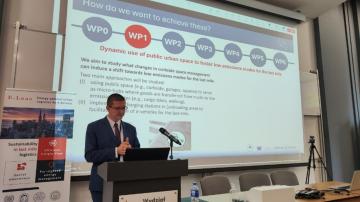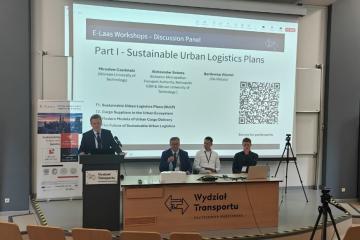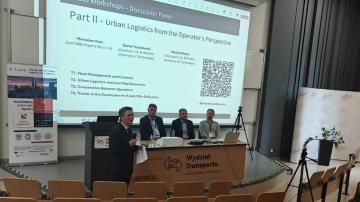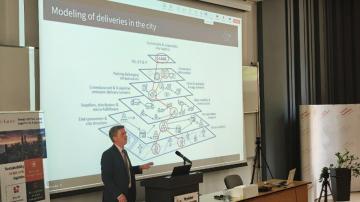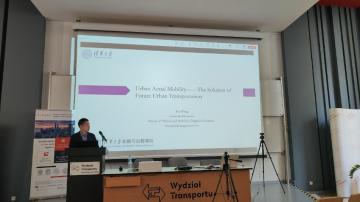Workshops summary
Warsaw 20-21.08.2024
Sustainable Urban Logistics at the E-Laas Workshop: New Technologies and Stakeholder Collaboration as the Key to Success
The E-Laas (Energy optimal urban Logistics As A Service) workshop took place at the Faculty of Transport of the Warsaw University of Technology (WUT), where on August 20-21, 2024, scientists, industry representatives, and local authorities gathered to discuss challenges and modern approaches related to sustainable urban logistics. The event addressed key issues concerning the integration of innovative freight distribution models, modern technologies, energy management, and urban space, considering the needs of growing cities and their residents.
The goal of the E-Laas workshop was to create a platform for sharing knowledge and experiences on sustainable urban logistics and energy-efficient transport solutions. The workshops aimed to identify key challenges and opportunities related to urban logistics, including spatial planning and energy management, and to develop joint strategies that could be implemented by cities and regions worldwide. Additionally, the event sought to build and strengthen professional networks among participants, which may contribute to future research and development cooperation.
The workshop was opened by Prof. Marianna Jacyna, Dean of the Faculty of Transport at the Warsaw University of Technology, who welcomed participants and guests, emphasizing the importance of urban logistics in the face of growing urbanization, increasing transport demand, and challenges related to energy management and environmental pollution. The event was divided into three parts: a networking session, discussion panels, and a technical session.
The networking session aimed to maximize the benefits of the event by fostering cooperation among participants and accelerating progress in sustainable urban logistics. During this session, three key research projects were presented:
- E-Laas (Energy optimal urban Logistics As A Service) – Emilian Szczepański (Faculty of Transport, WUT) presented an innovative approach to shaping urban logistics, focusing on efficient last-mile delivery planning while addressing sustainability issues by integrating energy-efficient and zero-emission logistics solutions with social needs.
Presentation of the E-Laas Project – Emilian Szczepański (Faculty of Transport, WUT)
- UrbFRail (Revitalisation of Inner-Urban Freight Rail Hubs) – Maciej Śmieszek (Faculty of Transport, WUT) presented a tool supporting cities in developing urban freight transport zones using rail. The approach aims to facilitate the integration of rail transport with urban infrastructure by revitalizing rail sidings, which can lead to better space utilization and increased efficiency of urban logistics systems.
- Mobile electricity storage – Krzysztof Zagrajek (Faculty of Electrical Engineering, WUT) introduced the concept of mobile electric energy storage, which supports the integration of renewable energy sources in urban transport hubs. The proposed solution has great potential for managing energy in urban areas, taking into account the demand profile of recipients in different urban zones.
The presentations of current research projects aimed to identify areas where various approaches can complement one another. This will allow achieving synergy, more efficient resource use, and the development of new solutions for urban logistics.
The next part of the workshop featured discussion panels, which were the main highlight of the event, allowing participants to gain a deeper understanding of the complexity of urban logistics issues and the challenges faced by logistics operators, city managers, customers, and society. The discussions, moderated by Prof. Konrad Lewczuk from the Faculty of Transport, WUT, covered two main topics:
- Sustainable Urban Logistics Plans (SULP) – Experts, including Mirosław Czerliński from the Faculty of Transport, WUT, Bartłomiej Wiertel from Via Vistula Sp. z o.o., and Aleksander Sobota from the Upper Silesian-Zagłębie Metropolis, discussed the importance of SULP as a tool for urban logistics planning. The discussions focused on integrating logistics with spatial planning, the challenges of involving various stakeholders, and the need for modern analytical tools to optimize logistics processes. Participants emphasized that SULPs are essential for creating more efficient and sustainable logistics systems that can help reduce emissions and improve the quality of life for city residents.
Discussion Panel – Sustainable Urban Logistics Plans
- Urban Logistics from the Operator’s Perspective – The panel included Mirosław Gral from Last Mile Experts Sp. z o.o., Daniel Trzaskowski from Carefleet S.A., and Michał Wojtal from Pointpack S.A. Experts focused on challenges related to fleet management, integrating electric vehicles, optimizing last-mile deliveries, and the importance of cooperation among operators to increase operational efficiency. Panel participants highlighted the need for developing digital resource management platforms to support better coordination of activities among different entities, which in the long term will contribute to reducing operational costs and improving delivery efficiency.
Discussion Panel – Urban Logistics from the Operator’s Perspective
On the second day of the workshop, a technical session took place, providing an opportunity to present advanced research conducted by teams from partner universities participating in the E-Laas project. This session allowed participants to learn about the latest research and innovative technologies that could significantly impact the future of urban logistics.
Emilian Szczepański, Jan Paszkowski, and Konrad Lewczuk (Faculty of Transport, WUT) presented current research conducted within the E-Laas project, focusing on energy management and the application of macro and microsimulations in shaping urban logistics systems.
Konrad Lewczuk (Faculty of Transport, WUT)
Balázs Kulcsár and Fangting Zhou (Chalmers University of Technology) presented research on on-demand transport services and intelligent energy pricing policy for managing vehicle charging.
Balázs Kulcsár (Chalmers University of Technology)
Jingwen Wu and Xueting He (Shanghai University) presented a method for optimizing courier routes in a new last-mile logistics service, considering the uncertainty of future orders, as well as a method for determining bus routes in an on-demand service model. Kai Wang (Tsinghua University) introduced research on passenger mobility systems using autonomous drones and cargo transport systems integrating freight drones and courier vehicles.
Kai Wang (Tsinghua University)
The E-Laas workshop concluded successfully, serving as an opportunity for intensive discussions and debates. During the two-day event, many key issues related to sustainable urban logistics were discussed, and numerous significant conclusions and research directions were formulated, which may have a substantial impact on the future development of cities and last-mile deliveries.
Workshop participants unanimously emphasized the need for shared responsibility for the sustainable development of cities. Effective urban logistics requires the involvement of all stakeholders—from the state and local authorities, through entrepreneurs and logistics operators, to customers and the local community. Only through cooperation and an integrated approach can solutions be developed that are both efficient and environmentally friendly.
The crucial issue of developing Sustainable Urban Logistics Plans (SULP) was also addressed, which are key tools enabling cities to plan logistics in a way that minimizes negative environmental impacts while meeting economic and social needs. The workshop demonstrated that technological advancements, such as the development of drones, delivery robots, electric vehicles, and mobile logistics hubs, offer new opportunities to improve urban logistics. At the same time, attention was drawn to the need for integrating advanced planning and analytical tools to better adapt logistics services to the dynamically changing needs of residents and businesses. The E-Laas workshop created a unique platform for exchanging knowledge and experiences, highlighting the importance of collaboration and innovative solutions for the future of urban logistics.
The workshop was part of the E-Laas scientific project (Energy optimal urban Logistics As A Service). This project is implemented under the ERA-NET Cofund Urban Accessibility and Connectivity (ENUAC China Call) competition, funded by JPI Urban Europe and the National Natural Science Foundation of China (NSFC), and from the European Union’s Horizon 2020 research and innovation program under grant agreement No. 875022. The Polish part of the project is financed by the National Science Centre, Poland (project number 2022/04/Y/ST8/00134).

